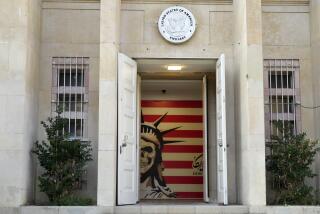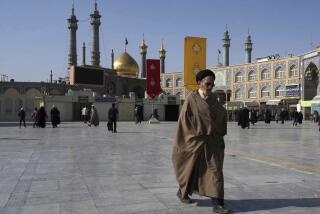Iran’s Mousavi urges continued civil disobedience
- Share via
BEIRUT — Iran’s leading opposition figure Saturday called on his supporters to continue acts of peaceful civil disobedience, in his first major statement in weeks.
Mir-Hossein Mousavi also demanded that authorities launch an independent inquiry of the disputed presidential election and punish anyone who abused protesters or detainees during the unrest that followed.
“We shouldn’t leave any stone unturned and live to up to our commitments in our struggle against cheaters and liars,” he said in a statement on his website, kaleme.com. “In pursuing our cause, we should brave all accusations, and we shouldn’t duck any act of courage or daring.”
Mousavi, a former prime minister, challenged President Mahmoud Ahmadinejad in the June 12 election, which was marred by allegations of massive vote-rigging. Although Mousavi’s deputies have been hauled before tribunals in a televised mass trial because they questioned the election results, he has remained unbowed.
Mousavi’s message to his supporters came two days after the Iranian parliament voted to approve a Cabinet dominated by hard-line Ahmadinejad loyalists, disappointing opposition figures who had hoped that the battered president would be further weakened in a lengthy brawl over the formation of his government. Only three of his 21 picks were rejected.
Mousavi unveiled no new strategy for his Green Path of Hope, the grass-roots political movement he formed in mid-August. But he implicitly called for a continuation of nightly rooftop chants and demonstrations against the government.
“There is no way but praying to God and calls of [Allahu akbar, “God is great”] in small and big gatherings,” he said in the statement.
Earlier in the week, Maj. Gen. Mohammad Ali Jafari, commander of the hard-line Revolutionary Guard, delivered a speech labeling reformists such as former President Mohammad Khatami enemies of the state.
Their refusal to back down in the face of such threats suggests there will be no quick resolution of Iran’s greatest domestic political crisis since the early years after the 1979 Islamic Revolution.
“Despite the smear campaign of the state-run propaganda machine, it is we who are calling for the restoration of confidence and peace in society,” Mousavi said in his statement. “It is we who want to avoid any kind of extremism and violence.”
Authorities continue to be unnerved by Mousavi’s new movement. They have barred fans from entering certain soccer matches, apparently afraid that Mousavi supporters would turn the televised games into opposition rallies.
Last week, plainclothes security officials quashed a Ramadan supper gathering of detainees’ families and supporters outside Evin Prison, as well as a boisterous rally outside a mosque in downtown Tehran.
Authorities also canceled for the first time the annual mid-Ramadan ceremonies at the tomb of Ayatollah Ruhollah Khomeini, Iran’s revolutionary founder, after Mousavi supporters vowed to turn the event into an opposition rally.
Now, authorities nervously watch as opposition supporters talk of plans to chant anti-government slogans Sept. 18 during annual Quds Day commemorations in support of Palestinians. The day is marked by officially sanctioned rallies against Israel.
Mousavi announced a nine-point plan for defusing the political crisis, including creating a fact-finding committee to investigate election irregularities; reforming electoral laws; punishing violent elements in the security forces; offering restitution to victims of official violence; lifting curbs on independent news organizations; and barring military officials from interfering in politics.
“Now our people have felt in their skin, flesh and bones that the only way to save the country is peaceful coexistence of different tastes, walks of life, ethnicities, religions and schools of thoughts in this vast country whose diversity of lifestyles and communities was part and parcel of her identity since ancient times,” Mousavi said.
--
Special correspondent Ramin Mostaghim in Tehran contributed to this report.
More to Read
Sign up for Essential California
The most important California stories and recommendations in your inbox every morning.
You may occasionally receive promotional content from the Los Angeles Times.













